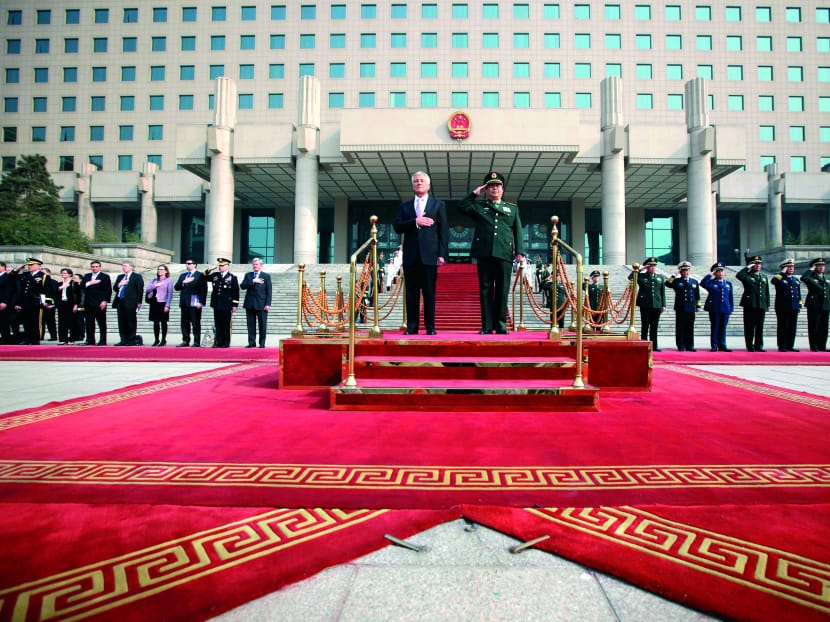US and China clash over disputed islands, exposing strain in ties
BEIJING — The defence chiefs of China and the United States yesterday clashed over Beijing’s handling of regional territorial disputes, as they discussed ways to improve military ties.

United States Secretary of Defence Chuck Hagel and Chinese Defence Minister Chang Wanquan during a welcome ceremony at the Chinese Defence Ministry headquarters in Beijing. Photo: Getty Images
BEIJING — The defence chiefs of China and the United States yesterday clashed over Beijing’s handling of regional territorial disputes, as they discussed ways to improve military ties.
On the second day of his official visit to China, US Defence Secretary Chuck Hagel said Beijing does not have the right to unilaterally establish an air defence zone over a large swathe of the East China Sea, including disputed islands controlled by Japan.
“That adds to tensions, misunderstandings and could eventually add to, and eventually get to, dangerous conflict,” said Mr Hagel.
He added that the US will protect Japan in a dispute with China.
In a forceful response, China’s Defence Minister Chang Wanquan said China will not take the initiative to stir up trouble with Japan, but Beijing is ready to use its military if needed to safeguard its territory.
“We will make no compromise, no concession, no trading, not even a tiny ... violation is allowed. The Chinese military can assemble as soon as summoned, fight any battle and win.”
He accused Japan of “confusing the right with the wrong” in asserting control over the disputed islands, which “China has indisputable sovereignty over”.
He also warned that the US must stay vigilant against Japan’s actions and not be permissive and supportive of Tokyo.
Mr Chang railed against the government of Japanese Prime Minister Shinzo Abe, whom Mr Hagel met in Tokyo last weekend.
“It is Japan who is being provocative against China,” Mr Chang said at a news conference after talks with Mr Hagel.
The Chinese minister also chided another US ally, the Philippines, for “disguising itself as a victim” and renewed Beijing’s opposition to Manila’s pursuit of international arbitration in its festering territorial dispute in the South China Sea.
China claims 90 per cent of the 3.5 million sq km South China Sea, where the Philippines, along with other countries, stake claims.
Mr Hagel, who met the Philippine Defence Minister last week, said he raised US concerns in Beijing over the tension in the South and East China seas. He cautioned that no countries should resort to “intimidation, coercion or aggression to advance its claims”.
“The Philippines and Japan are long-time allies of the US. We have mutual self-defence treaties with each of those two countries,” Mr Hagel said. “And we are fully committed to those treaty obligations.”
The exchange punctuated a visit that US defence officials had sought to present as a long-awaited deepening of military relations between the two countries.
On Monday, Mr Hagel became the first foreign military dignitary allowed on board a Chinese aircraft carrier, and yesterday, the US and China announced a series of modest steps towards improving defence and military communications.
“Our vision is a future where our militaries can work closely together on a range of challenges, such as humanitarian assistance and disaster relief missions. However, to reach this objective, we must be candid about issues where we disagree,’’ Mr Hagel said.
He also said the two countries have agreed to conduct a joint military medical exercise, though no date was set.
However, there appeared to be no closing of the gaps on more contentious issues such as cybersecurity.
Mr Hagel called on China to be more open about its cyberwarfare capabilities, which American officials have said Beijing uses for commercial espionage. AGENCIES






